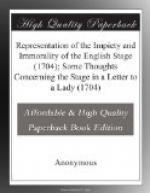‘Some Thoughts Concerning the Stage in a Letter to a Lady’ was ascribed by Halkett and Laing to Josiah Woodward, who was associated with the Society for the Reformation of Manners, and the ascription has been referred to by later writers on the controversy over the immorality of the stage. According to Sister Rose Anthony (op. cit., pp. 203-209), Jeremy Collier may have issued a pamphlet as a supplement to his ‘Dissuasive from the Play-House’, which was first published late in 1703; and it has been conjectured (cf. ‘Critical Works of John Dennis’, I, 501, 505) that ‘Some Thoughts’ might be that work, especially since Dennis, at the end of ’The Person of Quality’s Answer to Mr. Collier’s Letter’, refers to a quotation from Tillotson which appears on pages 8-9 of ‘Some Thoughts’ and begins his reference to the pamphlet by designating it as a “Letter written by you [Collier], tho’ without Name.” In any event, both ‘A Representation’ and ‘Some Thoughts’ stem from the renewed opposition to the stage which arose in the winter of 1703-1704 and were activated in part by the belief that the great storm of 1703 was a judgment brought on England by, among other faults, the licentiousness of the stage.
Both of the items printed in this issue are reproduced, with permission, from copies in the library of the University of Michigan.
&nb
sp; Emmett
L. Avery
State
College of Washington
A
representation
of the
Impiety & Immorality
of the
English Stage,
With
Reasons for putting a Stop thereto: and some
Questions Addrest to those
who frequent the Play-Houses.
The Third Edition.
London,
Printed, and are to be Sold by J. Nutt near Stationers-Hall,
1704.
A
representation
of the
Impiety & Immorality
of the
English Stage.
The various Methods that have been used for Preventing the outragious and insufferable Disorders of the stage, having been in a great measure defeated: It is thought proper, under our present Calamity, and before the approaching Fast, to collect some of the Prophane and Immoral Expressions out of several late plays, and to put them together in a little Compass, that the Nation may thereby be more convinced of the Impiety of the Stage, the Guilt of such as frequent it, and the Necessity of putting a Stop thereto, either by a total Suppression of the Play-Houses, as was done in the Reign of Queen Elizabeth, or by a Suspension for some considerable time, after the Example of other Nations; where, we are informed, the Stages were very chaste, in respect of ours of this Nation, who are of a Reformed Religion, and do with so much Reason glory in being of the best constituted Church in the World; nay, ’tis out of doubt but the Theatres even of Greece and Rome under Heathenism were less obnoxious and offensive, which yet by the Primitive Fathers and General Councils stood condemned.




